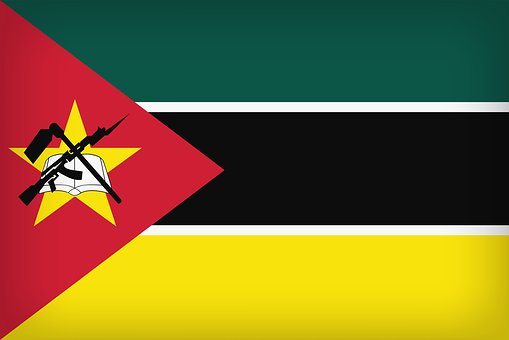Mozambican Churches Urge Decisive Government Action on Deadly Armed Conflict
By Fredrick Nzwili Fredrick, a freelance journalist based in Nairobi, Kenya. Originally posted here by the World Council of Churches.
As Mozambican churches respond to growing humanitarian challenges in the country, their leaders are urging the government to act decisively to end a violent conflict in the north which has left behind a trail of death, destruction and displacement.
The church leaders’ focus is on Cabo Delgado, a northern province, where attacks blamed on an extremist group have disrupted peace, economy and local lives since 2017.
The attacks, which have killed hundreds, destroyed villages and towns, and forced thousands to flee their homes, have moved the church leaders to describe their country as weeping.
“Mozambique and Mozambicans are weeping…Some are weeping while praying…running…searching for food, for clothes, for water. Others are weeping while caring for those who are traumatized…,” said Rev. Dr Felicidade Naume Chirinda, president of the Christian Council of Mozambique.
In one of the most horrifying and shocking acts, according to the church leaders, militants attacked Palma town on 24 March, killed dozens and held half of the town for 10 days.
Palma is a sea port in gas-rich Cabo Delgado Province. Initially a sleepy fishing centre, the town stirred to life after international oil and gas companies invested heavily to extract the colossal natural gas deposits discovered in the area in 2012.
“The attacks and killing were not only done to Palma inhabitants, but to the whole country,” said Chirinda. “No one accepts that people can be beheaded like chickens in front of their children.”
According to the cleric, the latest developments have left the people doubtful about their security and fearful that attacks can happen anywhere any time.
For Bishop Joaquina Filipe Nhanala, resident bishop of the United Methodist Church, Mozambique Area, the attacks in Cabo Delgado are an “outside invasion.” She highlighted separate rebel attacks and a wave of kidnapping of influential business people in Mozambique.
“These result in thousands of displaced people and a number of deaths. These come to add to a country already devastated by successive cyclones,” said Nhanala.
Church officials say at least 700,000 people have been displaced and about 1,500 killed in the violence in Cabo Delgado.
“The immediate needs should include making all efforts to bring security back to the province. This rapid response plan should aim at providing urgent lifesaving and life-sustaining assistance for hundreds of thousands still in insecure areas as well as displaced and host communities,” said Rev. Victoria Chifeche, programme manager, Ecumenical Committee for Social Development.
Chifeche said the displaced are mainly women, children, elderly and persons with disabilities, whose lives, dignity and protection have been completely disrupted.
“They need shelter, food kits, supplementary food for nutrition for babies, food items, kitchen kits, student kits, among other basic needs,” she said.
In 2020, the Ecumenical Committee for Social Development, a member of ACT Alliance, provided water, sanitation and hygiene services, agricultural tools and seeds as part of humanitarian response to 1,000 households displaced in Cabo Delgado. Tearfund provided the funding. From March 2021, the Ecumenical Committee for Social Development will provide shelter to 300 households in the Corrane centre for internally displaced people with funding from Diakonie Katastrophenhilfe.
Nhanala believes greed related to the natural gas resource is the main cause of the violence.
“Cabo Delgado is one of the poorest provinces in the country, and so there is a high rate of unemployment and poverty, prompting the invaders to be embraced through promises of better life for the youngsters,” she said.
According to Bishop Dinis Matsolo of the Methodist Church of Southern Africa, Mozambique Synod, the general situation in the country is horrific following violent attacks by a group known as Al-Shabaab (no links with the Somali-based al-Qaeda affiliate by the same name).
“The group kidnaps people, especially young boys and girls, tortures, rapes, decapitates those who try to resist or run away, and burns their houses,” said Matsolo.
He said the Christian Council of Mozambique, Mozambican Episcopal Conference and the Mozambican Islamic Council have joined to aid the affected people in Cabo Delgado.
“The Christian Council of Mozambique created community and Inter-religious dialogue platforms to provide interaction spaces and foster dialogue, and peaceful and harmonious coexistence,” said Matsolo. “We started pastoral counselling and accompaniment on the ground.”
He urges the government to take seriously the situation, and seeks regional and global support.
“Military intervention cannot be avoided… but it should not be seen as the only solution,” said Matsolo. “There is a need to work on addressing…poverty and unemployment by engaging young people on peace… and income-generating projects and to construct regional alliances for peace and harmonious coexistence and anti-terrorism.”
The bishop said humanitarian assistance is paramount and urgent, while calling for proper coordinating and planning to capture everybody. He urges the international community to a joint effort to eliminate the problem before it escalates.
“We need to act quickly as a collective to minimize the suffering of the people, but above all, to end violence and build resilience to prevent war from reemerging,” he said.

